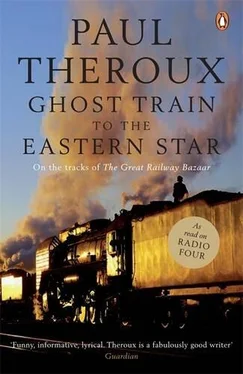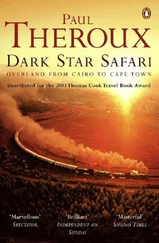Even at the larger stations no people appeared, nothing stirred. Bureya was a low town of square Siberian cottages, some prettified with gingerbread, with smoking chimneys. Where the fences had fallen and the birches iced up, the delicacy of black and white, the land looked like an Andy Wyeth snowscape.
Most days were to be like that, villages of low smoking huts, like Amazar on the Shilka River, hundreds of chimneys sending up white smoke, huddled behind flimsy wooden fences, many miles apart, birch groves, bare trees, a monumental emptiness of snow and sky, the Trans-Siberian moving across the snow like a ship across a frozen sea.
After two days and two nights we had penetrated to an even more desolate region. I had my yakuza book to read, some more Simenons. And I had some writing to do — notes on this trip and the memoir of my father, who, every day as I wrote about him, seemed to recede, smiling pityingly at me.
When I boarded this train in the winter of 1973-V41 had no clear idea how many days it would take to get to Moscow. With delays and blizzards, it ran late, and I ended up spending Christmas on it, feeling miserable and homesick. Now I had my kupe to myself. I could not have been more content, sitting in this privacy, watching the cooling gold light from the sinking sun redden the snow and the birch bark, making the world seem so far away. I was released from all concerns, floating across the snowfields.
I made another visit to the dining car. The knob-nosed waiter-chef was a whole day dirtier and grouchier. His fingernails were still rimmed with black; he wore a black cotton hoodie and dark woolen trousers and heavy boots. His thick glasses were smeared with grease. He smoked and tapped on his old computer, but when he took my order he scribbled with a pencil on torn scraps of paper.
" Salyanka" I said. Stew. And, enunciating slowly, " Ya-ich-nitsa" Fried eggs.
With the sort of frustrated intelligence that made him impatient and resentful, he had the look of a Dostoyevskian anarchist or a dissident. But of course he was neither, just an underpaid slob who ran the unpopular dining car with his wife. All this woman ever did was roll paper napkins on a stick to make them into tubes that she placed in vases on the tables to mimic bouquets. Apart from a few drunks, I never saw any other diners. I began to avoid the dining car.
A few days later, I encountered the waiter-chef's wife in the vestibule of one of the cars. It was thick with layers of frozen ice and blown-in snow.
She gabbled at me. I was sure she was saying, "Where have you been? Come and eat!" But by then I was living on noodles and the smoked fish and sausages I bought on the railway platforms.
Mogocha, one of those platforms, was a sprawl of houses, some big wolf-like dogs frolicking in the snow, a man in a fur hat lifting his boots high because of the deep drifts, and a bus chugging down a riverbank and across a frozen river. Many of the cottages had carved and ornamented blue shutters — a small wood-burning town, looking centuries old, as perhaps it was.
In the past I had sneered at a half-buried place like this and wanted to move on. Now I saw it as not bleak but peaceful, a quiet refuge, muffled by snowdrifts, entirely self-sufficient, too far from Moscow for anyone to care about it, the sort of place I might live in if it weren't so damnably cold.
For hundreds of years this region had been a place of exile. At dusk that day we came to Chernyshevsk-Zabaikalsky. It was as remote and cozy-looking as Mogocha, and it had been a prison for the literary critic and novelist Nikolai Chernyshevsky, who had been exiled there in 1864. His was another typical story of the dangers of expressing an opinion in Russia, but he was a czarist victim. He had advocated the freeing of serfs and the emancipation of women, and he had argued in many essays that art needed a purpose. After enduring a mock execution, he spent twenty-five years in hard labor and Siberian exile. His crime? "Subversion." Four months after returning home from Siberia, he died, aged sixty-one. He had written a novel while in exile, called What Is to Be Done? (Shto Delat? ), and it became a socialist tract, which was why there was a brooding silver statue of the man in front of the railway station.
I was reminded here, and elsewhere on this train, of something Nabokov wrote in one of his essays — that much of Russian literature has the smell of the prison library.
***
BEING ON THE TRANS-SIBERIAN was indeed like being on a ship, not any old ship, and not a cruise liner, but an old iron freighter plowing through a frozen sea, complete with grumpy deckhands, bad food, and an invisible captain. And with the same sort of smugness for the passenger inside that I happened to be, warm and comfortable, the deadly elements out the window, the sleet sometimes lashing the glass.
If there was a Trans-Siberian challenge, the seven nights and days on the long-distance train, it wasn't getting the visa or the ticket or finding one's way to Vladivostok; it was the usual obstacle in travel, the mental challenge. Russians overcame it by staying drunk — the men, anyway. So when I roamed around the train, all I saw were people drinking beer or vodka or else sleeping it off. For a Russian, a train journey of this length was a bender, and because of this, most of them were incoherent.
Nobu was hopping to keep warm on the snowy platform of Ulan-Ude in the early morning. I asked him how he was managing.
"The men in my compartment are very alcoholic," Nobu said. "They start in the morning when they wake up. They drink all day."
He didn't drink. He was snapping pictures and making notes. Now and then we met in a vestibule and talked about Murakami's novels or tried to guess how cold it was outside.
A Mongolian-looking man approached me at Ulan-Ude — squat, round-cheeked, Asiatic. As this was the railway junction for the line to Mongolia and China, I was curious to know his ethnicity. He told me he was a Buryat, and would I like to buy some manti7?
They were steaming meat-filled dumplings — I knew the word because I'd heard manti for dumpling in Turkey and elsewhere.
As he wrapped them, he said, "You American?"
"Yes, American."
"Mee-sippi," he said. "Al-bama. Flodda."
"I'm from Boston."
"Boston Bruins," he said without hesitating, still wrapping the dumplings.
"You like hockey?"
"New York Rangers," he said and handed me the package of dumplings. "Good manti. Sank you. Good journey."
What sent this cheery soul away was the sight of three drunks from the train staggering towards us. It was not yet nine in the morning. They were crapulous and carrying blue cans of beer, one of them with a can in each hand.
"We Marine!" one of them said to me. He told me his name was Fyodor and that they were based on a ship in Vladivostok.
The others began to shout incoherently. They wore track suits and slippers. They were going to Nizhni Novgorod, three days west of here.
When they had gone, I saw Nobu taking a picture of Ulan-Ude Station, where, under the station sign, the temperature was given in a lozenge of red lights. It was minus-17 Celsius.
My surprise in this frozen station in the middle of the Siberian steppe was that my BlackBerry buzzed with messages, some of them from Penelope, quite a few urging me to buy Viagra or to have my penis enlarged or to invest in promising stocks. Spam in the wilderness. But a mile out of Ulan-Ude it went dead — as it had been through the whole of Japan — and its only use was as a night light or (as I had used it for months) an emergency flashlight when I woke at night and groped down the carriage to take a piss.
Rolling through deepening snow — the effect of Lake Baikal — I spent the day writing about my father and thinking how nothing had changed on the line since I'd last taken it, thirty-three years ago. The train was still a big clanking antique, the food was still filthy, the trackside villages were still collections of wood-burning bungalows. The railway personnel, especially the women, were diligent about knocking the ice out of the drains with a long-handled ax and keeping the samovar going, but apart from that, there was no service to speak of. They were inattentive to passengers, but scrupulous about standing at attention in uniform by the coach at every stop.
Читать дальше












